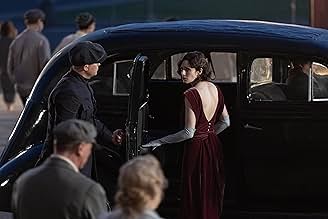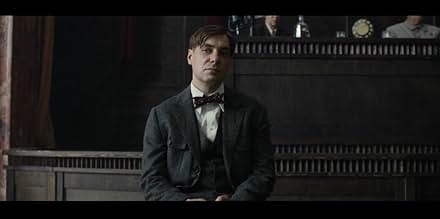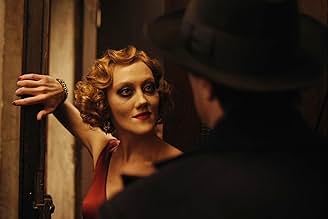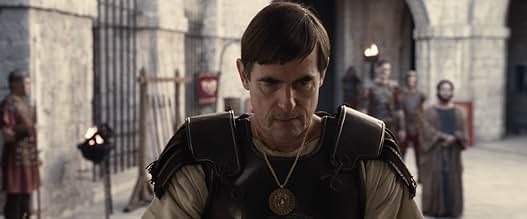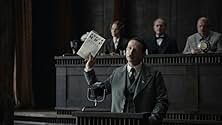VALUTAZIONE IMDb
7,2/10
4879
LA TUA VALUTAZIONE
Un famoso scrittore viene censurato dallo Stato sovietico: il suo romanzo viene bandito e la prima teatrale della sua nuova opera su Ponzio Pilato viene annullata.Un famoso scrittore viene censurato dallo Stato sovietico: il suo romanzo viene bandito e la prima teatrale della sua nuova opera su Ponzio Pilato viene annullata.Un famoso scrittore viene censurato dallo Stato sovietico: il suo romanzo viene bandito e la prima teatrale della sua nuova opera su Ponzio Pilato viene annullata.
- Regia
- Sceneggiatura
- Star
- Premi
- 14 vittorie e 9 candidature totali
Aleksei Guskov
- Maygel
- (as Aleksey Guskov)
Recensioni in evidenza
The book. The film. The book. The film. A continuous confrontation with no winners. In my book (pun intended), with The Master and Margarita by Bulgakov you can't do the film without the book. And this is my major premise in this review. Had I not reacquainted myself with the book prior to the film, I wouldn't have gained either the gist of the latter or the dark satirical wisdom of the novel yet again. Instead, I had done my homework: immersed myself in the book, watched professors of literature on Bulgakov's hidden motives, vicariously walked along Moscow streets with the help of a youtube tour.
One of the crucial things I quarried on this expedition is that Bulgakov spent 12 years writing the masterpiece (between 1928 and 1940). No wonder, this resulted in incredible density of the text: 2-dimension narrative, vividly drawn characters, spellbinding dialogues and descriptions. Every plotline comes packed with loads of profound subtexts. And again, I could only appreciate all this only after my versatile reasearch. Let's take Frida's appearance for example. Seemingly passing, this character alludes to the idea of MERCY and the way Margarita gracefully personifies MERCY. She raises to the challenge of freeing Frida from eternal punishment. This clemency is mirrored by Pilat's reluctance from eternal punishment to extend MERCY to Yeshua (Jesus of Nazareth) in Jerusalem setting of the novel.
Methinks, MERCY is the crux of the novel. Methinks, it never shone through in the film though. Having embraced all the landmark events, the director chose to rearrange them in another order under the over-arching story of Master and Margarita's romance. I have to say it for the director, the reshuffled episodes are given in a surprisingly cohesive order. And yet, you can't have it all. If you focus on the love line, you cannot thoroughly cover Professor Woland (the devil) and his retinue's visit to Moscow. The way they challenge moscovites' religious convictions and condemn the behaviour of Massolit's corrupt social climbers and profiteers, Behemoth's whims and Koroviev's vagaries also have to go. Interestingly though, the creators took the risk of adding one more dimension - the author's life, which allegedly parallels Michhail Bulgakov's misfortunes and hardships against the backdrop of heavy criticism for his works and plays.
So, in the production the main character Master is somewhat expanded: not only does he personify the book character, but he also sheds some light on Bulgakov's love-hate relationship with the Soviet authorities. Both personalities were successfully performed by Eugeny Tsyganov. He was really convincing in his role of a distressed and desperate genius. His devoted lover Margarita by Julia Snigir left me cold. Guilty as charged, I couldn't help comparing this cinematic milk-and-water Margarita to that I envisaged when reading. My Margarita came across as a volatile and vibrant woman, let alone her witch's acquired personality. Having turned into a witch, Bulgakov's Margarita completely transformed, became restless, reckless even. Passion unleashed. None of this was played out by Julia. Unluckily, she could not hold her own with August Diehl - Woland (Devil in disguise). The latter, though, is a vital example of how successful directors' decisions can be cast wise. Orchestrating his character, August Diehl demonstrated an ample scope: from playful remarks to devilishly frightening preaches. Hats off!
Another movie character which made an indelible impression on me is Moscow. The city enveils each and every scene. The 3-dimension plot is set in utopian Moscow. Moscow which was in actual fact designed by Stalin's people. Moscow which never happened. These oppressive behemoth buildings hover over the humdrum of Moscow daily life, keep an eye on the citizens, remind them of the ruler. This formidable city could've been drawn with better graphics, but even so the mystique of the narrative rubbed off on me.
Needless to say, this multifarious creation has been getting a relentless onslaught of criticism. The critics' major contention is that this production is nothing more than just another slick "Hollywood-esque" knock off: the romance, the city, the blasts. Without wishing to encroach on culture-vultures' territory, I agree to disagree with this degrading look. Nor do I buy this "the film is based very loosely on the book" stance. Why should it be? We are looking at two different art forms here. Whereas literature is about setting off a reader's reflective judgments and imagining through language, cinematic art abounds in all sorts of technical and creative components: lighting, camera angles, sound design, editing, and acting. All these make a film a coherent and powerful visual tale. And from where I am standing, The Master and Margarita's cinematic adaptation panned out as powerful.
It's been two weeks since I finished reading and went to the cinema. The fact that I keep thinking about both the film and the book is quite telling. Seldom do I indulge in that profound research on cinematic forms. Apparently, both worked for me and triggered the whole gamut of emotions. In my mind palace these two are merging into each other, accomplishing each other. And this is a very complex and ingenious picture. I wouldn't have fathomed the film without a prior reading. Nor would my emotions would be that strong without the rendition. The manifold idea behind both of them makes plain "I liked", "I didn't like" review nigh on impossible. My recommendation is to do both and to make the cogs in your brain turn. Buckle down and enjoy the trip.
One of the crucial things I quarried on this expedition is that Bulgakov spent 12 years writing the masterpiece (between 1928 and 1940). No wonder, this resulted in incredible density of the text: 2-dimension narrative, vividly drawn characters, spellbinding dialogues and descriptions. Every plotline comes packed with loads of profound subtexts. And again, I could only appreciate all this only after my versatile reasearch. Let's take Frida's appearance for example. Seemingly passing, this character alludes to the idea of MERCY and the way Margarita gracefully personifies MERCY. She raises to the challenge of freeing Frida from eternal punishment. This clemency is mirrored by Pilat's reluctance from eternal punishment to extend MERCY to Yeshua (Jesus of Nazareth) in Jerusalem setting of the novel.
Methinks, MERCY is the crux of the novel. Methinks, it never shone through in the film though. Having embraced all the landmark events, the director chose to rearrange them in another order under the over-arching story of Master and Margarita's romance. I have to say it for the director, the reshuffled episodes are given in a surprisingly cohesive order. And yet, you can't have it all. If you focus on the love line, you cannot thoroughly cover Professor Woland (the devil) and his retinue's visit to Moscow. The way they challenge moscovites' religious convictions and condemn the behaviour of Massolit's corrupt social climbers and profiteers, Behemoth's whims and Koroviev's vagaries also have to go. Interestingly though, the creators took the risk of adding one more dimension - the author's life, which allegedly parallels Michhail Bulgakov's misfortunes and hardships against the backdrop of heavy criticism for his works and plays.
So, in the production the main character Master is somewhat expanded: not only does he personify the book character, but he also sheds some light on Bulgakov's love-hate relationship with the Soviet authorities. Both personalities were successfully performed by Eugeny Tsyganov. He was really convincing in his role of a distressed and desperate genius. His devoted lover Margarita by Julia Snigir left me cold. Guilty as charged, I couldn't help comparing this cinematic milk-and-water Margarita to that I envisaged when reading. My Margarita came across as a volatile and vibrant woman, let alone her witch's acquired personality. Having turned into a witch, Bulgakov's Margarita completely transformed, became restless, reckless even. Passion unleashed. None of this was played out by Julia. Unluckily, she could not hold her own with August Diehl - Woland (Devil in disguise). The latter, though, is a vital example of how successful directors' decisions can be cast wise. Orchestrating his character, August Diehl demonstrated an ample scope: from playful remarks to devilishly frightening preaches. Hats off!
Another movie character which made an indelible impression on me is Moscow. The city enveils each and every scene. The 3-dimension plot is set in utopian Moscow. Moscow which was in actual fact designed by Stalin's people. Moscow which never happened. These oppressive behemoth buildings hover over the humdrum of Moscow daily life, keep an eye on the citizens, remind them of the ruler. This formidable city could've been drawn with better graphics, but even so the mystique of the narrative rubbed off on me.
Needless to say, this multifarious creation has been getting a relentless onslaught of criticism. The critics' major contention is that this production is nothing more than just another slick "Hollywood-esque" knock off: the romance, the city, the blasts. Without wishing to encroach on culture-vultures' territory, I agree to disagree with this degrading look. Nor do I buy this "the film is based very loosely on the book" stance. Why should it be? We are looking at two different art forms here. Whereas literature is about setting off a reader's reflective judgments and imagining through language, cinematic art abounds in all sorts of technical and creative components: lighting, camera angles, sound design, editing, and acting. All these make a film a coherent and powerful visual tale. And from where I am standing, The Master and Margarita's cinematic adaptation panned out as powerful.
It's been two weeks since I finished reading and went to the cinema. The fact that I keep thinking about both the film and the book is quite telling. Seldom do I indulge in that profound research on cinematic forms. Apparently, both worked for me and triggered the whole gamut of emotions. In my mind palace these two are merging into each other, accomplishing each other. And this is a very complex and ingenious picture. I wouldn't have fathomed the film without a prior reading. Nor would my emotions would be that strong without the rendition. The manifold idea behind both of them makes plain "I liked", "I didn't like" review nigh on impossible. My recommendation is to do both and to make the cogs in your brain turn. Buckle down and enjoy the trip.
The Master and Margarita (2023) is simply the best film I've seen released in years, visually stunning, the iconic novel is adapted in the most thought-provoking perspective & grabs your imagination instantly. What I loved the most is that, IS NOT about the political prosecution of the author/protagonist; but about how the love of Margarita totally frees him, more than his muse -he writes for her, aware that the manuscript will probably end up in the fire- is the force that binds the book and his world together. Reality and fantasy are beautifully intertwined, and the writer can't tell what goes on in his mind from the outside world. All actors (incl. The cat Behemoth) are fantastic; particularly Yulia Snigir as Margarita, it is simply impossible not to fall in love with her from the moment she appears on the screen. The Devil / Voland here is also playful & more than perverse brings much needed humour, like a fellow who enjoys taking the piss ruthlessly at any price. So people keep comparing it to the series of 2005, well, i do not compare all love stories to Casablanca or Gone With the Wind, each period has different takes and creative freedom, I like this film more even than the book, which, let's face it, was an unfinished draft assembled by Bulgakov's widow, so let's stop slagging masterly done stuff when the original story wasn't even finished. Do not miss, real cinema lovers!!!!
As someone who read the book extensively before watching the movie, the director did an incredible job adapting Mikhail Bulgakov's book! I adored the spin they put on the story, from the way they adapted the storytelling to how they portrayed Woland. The stylistic choices were top notch and the costume designs were very well done. They left a few scenes from the book out (more than reasonable considering the movie is around 2.5 hours long already), they still had all the major plot points and small changes. I love how they put a nice change to how and why the Master was locked up, and how he created his own world and situations while in the mental facility.
All in all, incredible movie but Gella needed more screen time in my humble opinion. Go watch it!
All in all, incredible movie but Gella needed more screen time in my humble opinion. Go watch it!
The movie is done really well. It looks great, it's well edited, has great sound design and all the performances are flawless.
The timelines and realities are so convoluted that it would make Nolan scratch his head. However, the movie does a great job at keeping the story comprehensible and engaging.
I usually don't like long movies, but in this case the two and a half hours runtime is well justified and passed by quickly. There's no runtime padding and everything feels essential.
The only reason I subtracted one star is that the humor from the book didn't properly precipitate into this movie (but that's super subjective so take with a grain of salt). Otherwise it's a nearly perfect and innovative adaptation of a good book.
The timelines and realities are so convoluted that it would make Nolan scratch his head. However, the movie does a great job at keeping the story comprehensible and engaging.
I usually don't like long movies, but in this case the two and a half hours runtime is well justified and passed by quickly. There's no runtime padding and everything feels essential.
The only reason I subtracted one star is that the humor from the book didn't properly precipitate into this movie (but that's super subjective so take with a grain of salt). Otherwise it's a nearly perfect and innovative adaptation of a good book.
These days it's tempting to refuse anything Russian, but in this case one has to note that 1) this is adapted from the most celebrated work of Russian fiction in the 20th century, written by a Kiev-born dramatist shortly before his death and forbidden from publication in the Soviet Union until the 1960s, and 2) this was largely financed by an Odessa-born American billionaire who owns the sports network DAZN. Also, principal photography was finished in late 2021, before the invasion of Ukraine.
The phantasmagorical plot makes for an extraordinary reading experience because one cannot summarize it. Like all truly great literature, this is not really a story about something, it's a series of bizarre anecdotes set in the framework of forsaken romance in the claustrophobic Stalinist Moscow of the 1930s, where the Devil appears on the pages of a writer in crisis, and then seemingly in reality. German actor August Diehl's performance as Woland is the best of his career and he gives the character a perfect ambivalence which is required in portraying the supernatural. It is quite possible to read into his Satan an allegory of Putin himself, and it is also quite possible to deny it. The hysterical satire of the novel requires high production values which previous adaptations never achieved - this film almost overdoes it, as do many Russian actors. But the leading couple is quite convincing, even if they pale within the impressive imagery.
Upon release in Russia, the film was attacked by the Pro-Putin crowd which helped to turn this into the most successful Russian film of the century. It's a miracle it was even released since US-born director Lockshin finished post-production in the States and did not return to Russia after the invasion, which he has frequently condemned. So credit where credit is due, this film is a beacon of creative light in Russia's political darkness.
The phantasmagorical plot makes for an extraordinary reading experience because one cannot summarize it. Like all truly great literature, this is not really a story about something, it's a series of bizarre anecdotes set in the framework of forsaken romance in the claustrophobic Stalinist Moscow of the 1930s, where the Devil appears on the pages of a writer in crisis, and then seemingly in reality. German actor August Diehl's performance as Woland is the best of his career and he gives the character a perfect ambivalence which is required in portraying the supernatural. It is quite possible to read into his Satan an allegory of Putin himself, and it is also quite possible to deny it. The hysterical satire of the novel requires high production values which previous adaptations never achieved - this film almost overdoes it, as do many Russian actors. But the leading couple is quite convincing, even if they pale within the impressive imagery.
Upon release in Russia, the film was attacked by the Pro-Putin crowd which helped to turn this into the most successful Russian film of the century. It's a miracle it was even released since US-born director Lockshin finished post-production in the States and did not return to Russia after the invasion, which he has frequently condemned. So credit where credit is due, this film is a beacon of creative light in Russia's political darkness.
Lo sapevi?
- ConnessioniReferenced in Close-Up: The Master and Margarita (2024)
I più visti
Accedi per valutare e creare un elenco di titoli salvati per ottenere consigli personalizzati
- How long is The Master and Margarita?Powered by Alexa
Dettagli
Botteghino
- Budget
- 1.233.000.000 RUR (previsto)
- Lordo in tutto il mondo
- 28.727.824 USD
- Tempo di esecuzione2 ore 36 minuti
- Colore
- Proporzioni
- 2.39:1
Contribuisci a questa pagina
Suggerisci una modifica o aggiungi i contenuti mancanti

Divario superiore
What is the Canadian French language plot outline for Il maestro e Margherita (2024)?
Rispondi
![Guarda Trailer [OV]](https://m.media-amazon.com/images/M/MV5BZTk1ODEzN2MtYzRiZS00NTBlLWIxYmMtM2E4MzYxYTU4YWU0XkEyXkFqcGdeQXRyYW5zY29kZS13b3JrZmxvdw@@._V1_QL75_UX500_CR0)
